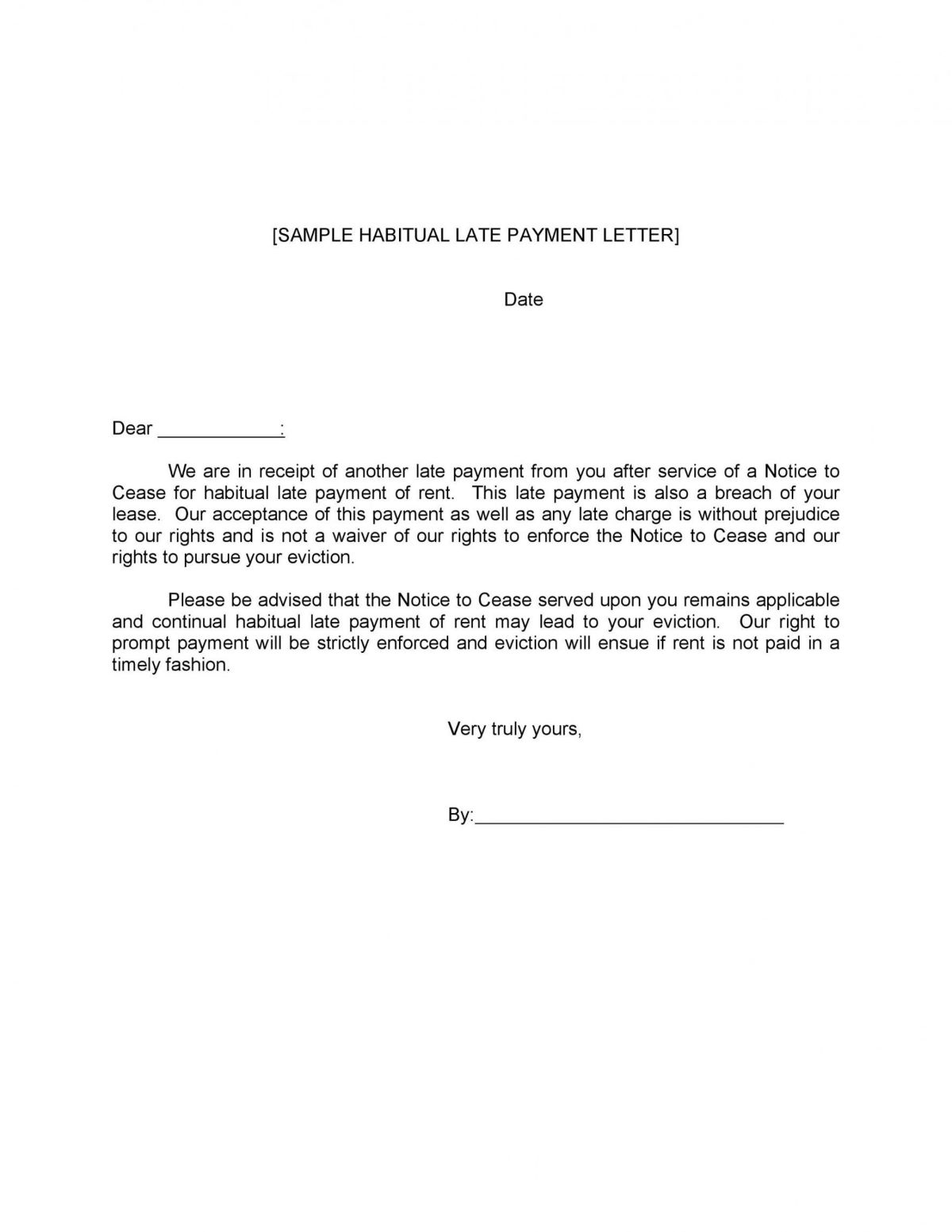

Finance
What Is Typical Late Fee For Rent
Modified: February 23, 2024
Learn about typical late fees for rent and how they impact your finances. Understand the importance of paying rent on time to avoid additional financial strain.
(Many of the links in this article redirect to a specific reviewed product. Your purchase of these products through affiliate links helps to generate commission for LiveWell, at no extra cost. Learn more)
Table of Contents
**
Introduction
**
Late fees for rent are a common aspect of the rental process. They are charges imposed by landlords on tenants who fail to pay their rent on time. While late fees can serve as a deterrent against late payments, they can also become a significant financial burden for tenants. Understanding the typical late fees for rent and the factors that influence them is crucial for tenants to manage their finances effectively.
Late fees for rent can vary widely based on factors such as location, rental agreement terms, and the landlord's discretion. It's important for tenants to be aware of the legal regulations governing late fees in their respective regions to ensure that they are not subjected to unfair or exorbitant charges. Additionally, knowing how to negotiate late fees with landlords and the potential consequences of late rent payments can empower tenants to navigate this aspect of renting more effectively.
In this article, we will delve into the typical late fees for rent, the factors that influence them, legal regulations surrounding late fees, average late fees across different regions, strategies for negotiating late fees, the consequences of late rent payments, and tips for avoiding late fees. By gaining a comprehensive understanding of these aspects, tenants can better manage their rental finances and maintain a positive landlord-tenant relationship.
**
Factors Affecting Late Fees
**
The late fees for rent can be influenced by various factors, and understanding these factors is essential for tenants to anticipate and manage their financial obligations effectively. Some of the key factors affecting late fees include:
1. Rental Agreement Terms:
The terms outlined in the rental agreement or lease play a significant role in determining the late fees for rent. Landlords typically specify the amount of the late fee and the grace period granted for late payments in the rental agreement. It’s crucial for tenants to thoroughly review and understand these terms before signing the agreement to avoid any surprises regarding late fees.
2. Local Regulations:
Local and state regulations can impact the maximum allowable late fees that landlords can charge. Some regions have specific laws governing late fees, including caps on the maximum amount that landlords can impose. Tenants should familiarize themselves with the legal framework in their area to ensure that they are not subjected to unjustifiably high late fees.
3. Landlord Discretion:
Landlords often have a degree of discretion when it comes to imposing late fees. While the rental agreement may stipulate a specific late fee amount, some landlords may be open to discussing or adjusting the late fee under certain circumstances. Building a positive and communicative relationship with the landlord can sometimes provide tenants with the opportunity to negotiate late fees.
4. Payment History and Tenant-Landlord Relationship:
The tenant’s payment history and the overall tenant-landlord relationship can also influence late fees. Tenants with a consistent record of timely payments and a positive rapport with their landlords may be granted more leniency in the event of occasional late payments. Conversely, tenants with a history of late payments may face stricter enforcement of late fees.
5. Market Conditions and Rental Demand:
In competitive rental markets with high demand, landlords may be more stringent in enforcing late fees as they have a greater pool of prospective tenants. Conversely, in a less competitive market, landlords may be more flexible with late fees to retain tenants.
By considering these factors, tenants can gain insights into the determinants of late fees for rent, enabling them to make informed decisions and effectively manage their rental finances.
**
Legal Regulations on Late Fees
**
Legal regulations play a crucial role in governing the imposition of late fees for rent, aiming to ensure fairness and prevent the exploitation of tenants. These regulations vary by region and are designed to protect tenants from exorbitant or unjust late fees. It’s essential for tenants to be aware of the legal framework in their respective areas to safeguard their rights and financial well-being.
Maximum Allowable Late Fees:
Many jurisdictions have specific laws that dictate the maximum allowable late fees that landlords can charge. These laws often set a cap on the late fee amount or specify a percentage of the rent as the maximum allowable late fee. By familiarizing themselves with these regulations, tenants can avoid being subjected to unfairly high late fees.
Grace Periods:
Legal regulations may also address grace periods for late rent payments. A grace period is the additional time granted to tenants beyond the due date before late fees are imposed. Some regions mandate a minimum grace period, providing tenants with a reasonable window to submit their rent payments without incurring late fees.
Transparency Requirements:
Legal regulations often emphasize transparency in the disclosure of late fees within rental agreements. Landlords are typically required to clearly outline the late fee amount, the grace period, and the conditions under which late fees are imposed in the rental agreement. This transparency enables tenants to understand their financial obligations and rights regarding late fees.
Enforcement and Remedies:
Regulations may also address the enforcement of late fees and the remedies available to tenants in the event of disputed late fees. Tenants may have the right to challenge unjust late fees through formal procedures outlined in the regulations, providing a mechanism for resolving disputes and seeking redress.
Tenant Resources and Advocacy:
Some regions offer tenant resources and advocacy services to educate tenants about their rights regarding late fees and provide assistance in addressing related issues. These resources can empower tenants to assert their rights and navigate any challenges related to late fees effectively.
By understanding the legal regulations governing late fees, tenants can advocate for fair treatment and make informed decisions regarding their rental agreements. It’s advisable for tenants to familiarize themselves with the specific laws and regulations applicable to their rental location to ensure that they are not unduly burdened by excessive or unjust late fees.
**
Average Late Fees for Rent Across Different Regions
**
The average late fees for rent can vary significantly across different regions, reflecting the diverse rental markets and regulatory environments. Understanding the typical range of late fees in various areas can provide valuable insights for tenants, enabling them to anticipate their financial obligations and make informed decisions when entering into rental agreements.
Regional Disparities:
Across the United States, the average late fees for rent can vary based on the prevailing rental market conditions, local regulations, and the discretion of individual landlords. In high-demand metropolitan areas with competitive rental markets, late fees may trend higher due to the abundance of prospective tenants, while in less competitive or suburban areas, late fees may be comparatively lower.
Maximum Allowable Late Fees by State:
Several states have specific laws that define the maximum allowable late fees that landlords can charge. For example, in California, late fees are limited to a maximum of 6% of the monthly rent amount, or $18 for properties with a monthly rent of $300 or less. In New York, late fees are capped at $50 or 5% of the monthly rent, whichever is less. Tenants should familiarize themselves with the regulations in their respective states to understand the permissible range of late fees.
Urban vs. Rural Disparities:
Urban and rural areas may exhibit disparities in average late fees for rent. In urban centers with high living costs and robust rental demand, late fees may be higher to deter late payments and mitigate financial risks for landlords. Conversely, in rural areas with lower rental demand and a more relaxed pace of living, late fees may be more modest to align with the economic circumstances of tenants.
Impact of Rental Market Dynamics:
Rental market dynamics, including vacancy rates, housing supply, and population growth, can influence the average late fees for rent. In areas experiencing housing shortages and heightened competition for rental properties, landlords may impose higher late fees to incentivize timely rent payments and maintain financial stability.
Tenant Awareness and Negotiation:
Armed with knowledge about the average late fees in their regions, tenants can engage in informed discussions with landlords regarding late fees during the lease negotiation process. By understanding the prevailing late fee norms, tenants may be better positioned to negotiate fair and reasonable late fee terms within their rental agreements.
By recognizing the regional variations in average late fees for rent, tenants can proactively manage their rental finances and navigate the rental landscape with a heightened awareness of the financial expectations associated with late payments.
**
Negotiating Late Fees with Landlords
**
While rental agreements typically outline the terms of late fees, tenants may have opportunities to negotiate these terms with their landlords, especially during the lease signing or renewal process. Effective negotiation can lead to more favorable late fee arrangements, providing tenants with greater financial flexibility and peace of mind. Here are some strategies for negotiating late fees with landlords:
1. Emphasize a Strong Payment History:
Tenants with a consistent record of timely rent payments can leverage their payment history as a negotiating point. By highlighting their reliability as tenants, they can demonstrate their commitment to fulfilling their financial obligations and request more lenient late fee terms from their landlords.
2. Propose a Reasonable Alternative:
Tenants can propose alternative late fee structures that align with their financial circumstances. For example, suggesting a lower flat fee or a graduated late fee scale based on the duration of the delay can present landlords with reasonable and flexible options that benefit both parties.
3. Discuss Grace Periods:
Grace periods provide tenants with additional time beyond the rent due date before late fees are imposed. Engaging in a dialogue with landlords about extending the grace period can be a constructive negotiation point, as it allows tenants a more forgiving window for submitting their rent payments.
4. Highlight Market Comparisons:
Tenants can research and present data on average late fees in the local rental market to provide landlords with a comparative perspective. Demonstrating an understanding of the prevailing late fee norms can lend credibility to tenants’ negotiation efforts and encourage landlords to consider more reasonable late fee terms.
5. Foster Open Communication:
Open and respectful communication with landlords is essential during the negotiation process. Tenants should clearly articulate their rationale for seeking adjusted late fee terms and express their commitment to maintaining a positive tenant-landlord relationship. Building a constructive dialogue can facilitate mutually beneficial outcomes.
6. Seek Legal Guidance:
In cases where tenants encounter resistance or unreasonable late fee terms, seeking legal guidance or consulting tenant advocacy resources can provide valuable support. Understanding the legal framework and tenant rights related to late fees can empower tenants to navigate negotiations effectively.
By approaching late fee negotiations with a proactive and collaborative mindset, tenants can potentially secure more favorable late fee terms, contributing to a more manageable and equitable rental experience.
**
Consequences of Late Rent Payments
**
Late rent payments can have various repercussions for tenants, impacting their financial standing, tenant-landlord relationships, and overall rental experience. Understanding the potential consequences of late payments is essential for tenants to mitigate risks and take proactive measures to address any challenges that may arise.
Accrual of Late Fees:
One of the immediate consequences of late rent payments is the accrual of late fees as outlined in the rental agreement. Landlords typically impose late fees as a deterrent against delayed payments, and these fees can compound over time, adding to the financial burden for tenants.
Damage to Credit History:
Consistently late rent payments can negatively impact tenants’ credit history and scores. Late payments may be reported to credit bureaus, leading to a decline in creditworthiness and potentially hindering tenants’ ability to secure future loans, rental agreements, or other financial opportunities.
Risk of Eviction:
Repeated or prolonged late rent payments can elevate the risk of eviction proceedings initiated by landlords. While eviction is a serious and distressing outcome, it can become a reality if tenants fail to address their late payment patterns and comply with the terms of their rental agreements.
Strain on Tenant-Landlord Relationships:
Consistent late payments can strain the tenant-landlord relationship, eroding trust and goodwill. Landlords may become increasingly vigilant or less accommodating in response to late payments, potentially leading to a deteriorated rapport and a less harmonious rental experience.
Legal Ramifications and Disputes:
Persistent late rent payments can result in legal disputes and formal actions initiated by landlords to recover unpaid rent or enforce lease terms. Such disputes can lead to legal expenses, stress, and potential damage to tenants’ rental and financial reputations.
Impact on Rental References:
When seeking future rental accommodations, tenants may be required to provide rental references from previous landlords. Consistently late rent payments can tarnish tenants’ rental references, reducing their desirability as prospective tenants in the eyes of future landlords.
By recognizing the potential consequences of late rent payments, tenants can take proactive steps to address any financial challenges, communicate transparently with landlords, and seek support or resources to ensure timely and consistent rent payments, thereby preserving their financial stability and positive rental experiences.
**
Tips for Avoiding Late Fees
**
Proactively managing rent payments is essential for tenants to avoid incurring late fees and maintain a positive tenant-landlord relationship. By implementing effective strategies and cultivating responsible financial habits, tenants can minimize the risk of late payments and the associated financial repercussions. Here are valuable tips for avoiding late fees:
1. Establish a Budget and Payment Schedule:
Create a comprehensive budget that includes rent payments and allocate funds accordingly. Establish a clear payment schedule, aligning it with your income cycles to ensure that rent payments are prioritized and made on time.
2. Set Up Automated Payments:
Consider setting up automated rent payments through your bank or a reliable payment platform. Automated payments can help streamline the rent payment process, reduce the risk of oversight, and ensure timely remittances without the need for manual intervention.
3. Utilize Reminders and Alerts:
Set up reminders or alerts on your mobile device or calendar to notify you of upcoming rent due dates. Utilizing digital tools or apps can help you stay organized and prompt in submitting your rent payments.
4. Communicate Openly with Landlords:
If you encounter temporary financial challenges that may affect your ability to make timely rent payments, communicate openly with your landlord. Proactively discussing any potential delays and exploring alternative payment arrangements can demonstrate your commitment to fulfilling your obligations.
5. Prioritize Rent Payments:
Make rent payments a financial priority, ensuring that funds are allocated for rent ahead of discretionary expenses. By prioritizing rent payments, you can minimize the risk of financial strain and late payments.
6. Familiarize Yourself with Rental Agreement Terms:
Thoroughly review the late fee terms and grace periods outlined in your rental agreement. Understanding these terms can help you anticipate the consequences of late payments and take proactive measures to avoid incurring late fees.
7. Seek Financial Assistance if Needed:
If you encounter unexpected financial hardships, explore available resources for financial assistance. Local community organizations, financial counseling services, or government programs may offer support to help you manage your rent obligations.
8. Monitor Your Bank Account Regularly:
Regularly monitor your bank account to ensure that rent payments are processed successfully and on time. Address any discrepancies or issues promptly to prevent late fees from accruing.
By implementing these tips and adopting a proactive approach to rent payment management, tenants can minimize the risk of late fees, maintain financial stability, and cultivate a positive and cooperative relationship with their landlords.
**
Conclusion
**
Understanding the dynamics of late fees for rent is pivotal for tenants to navigate the rental landscape with financial prudence and foresight. The typical late fees, influenced by rental agreement terms, local regulations, and market conditions, underscore the importance of informed decision-making and proactive financial management. By familiarizing themselves with the legal regulations governing late fees and the average late fees in their regions, tenants can advocate for fair treatment and negotiate more favorable late fee terms with their landlords.
The consequences of late rent payments, ranging from financial penalties to strained tenant-landlord relationships, underscore the significance of prioritizing timely rent payments and adopting responsible financial practices. By implementing strategies to avoid late fees, such as setting up automated payments, communicating openly with landlords, and prioritizing rent obligations, tenants can uphold their financial integrity and mitigate the risks associated with late payments.
Ultimately, the rental experience is enriched when tenants and landlords engage in transparent communication, mutual respect, and a shared commitment to upholding the terms of the rental agreement. By proactively managing late fees and rent payments, tenants can foster a harmonious and cooperative relationship with their landlords, contributing to a positive and sustainable rental experience for all parties involved.
Armed with knowledge, proactive financial habits, and effective communication, tenants can navigate the realm of late fees for rent with confidence, ensuring that their rental finances remain robust and their relationships with landlords remain amicable and mutually beneficial.














